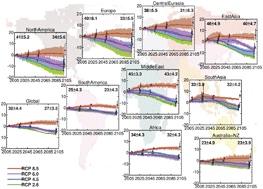*
Corresponding authors
a
Department of Earth and Environmental Sciences and Lamont-Doherty Earth Observatory of Columbia University, Palisades, NY, USA
E-mail:
amfiore@ldeo.columbia.edu
b
UCAR/Geophysical Fluid Dynamics Laboratory, NOAA, Princeton, NJ, USA
c
School of Earth and Environment, University of Leeds, Leeds, UK
d
Department of Atmospheric, Oceanic and Space Sciences, University of Michigan, Ann Arbor, MI, USA
e
Yale School of Forestry and Environmental Studies, New Haven, CT, USA
f
Department of Earth System Science, University of California, Irvine, CA, USA
g
Lawrence Livermore National Laboratory, Livermore, CA, USA
h
Agenzia nazionale per le nuove tecnologie, l'energia e lo sviluppo economico sostenibile (ENEA), Bologna, Italy
i
Met Office, Hadley Centre, Exeter, UK
j
CICERO, Center for International Climate and Environmental, Research-Oslo, Oslo, Norway
k
Deutsches Zentrum für Luft- und Raumfahrt (DLR), Institut für Physik der Atmosphäre, Oberpfaffenhofen, Germany
l
Geophysical Fluid Dynamics Laboratory, NOAA, Princeton, NJ, USA
m
GAME/CNRM, Météo-France, CNRS – Centre National de Recherches Météorologiques, Toulouse, France
n
National Center for Atmospheric Research, Boulder, CO, USA
o
School of GeoSciences, The University of Edinburgh, UK
p
National Institute for Environmental Studies, Tsukuba, Japan
q
Goddard Institute for Space Studies, NASA, New York, NY, USA
r
Nagoya University, Nagoya, Japan
s
Laboratoire des Sciences du Climat et de l'Environnement LSCE-IPSL, CEA/CNRS/UVSQ, Gif-Sur-Yvette, France
t
Research Institute for Applied Mechanics, Kyushu University, Fukuoka, Japan
u
National Institute of Water and Atmospheric Research, Lauder, New Zealand


 Please wait while we load your content...
Please wait while we load your content...